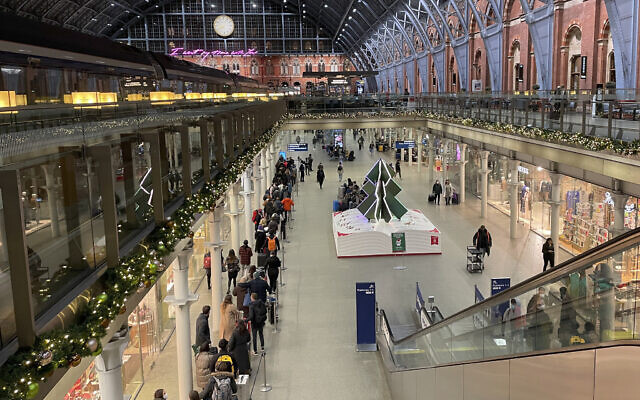British officials are reportedly making plans for a two-week so-called “circuit breaker” lockdown after Christmas, as Europe braced for tighter curbs to rein in the spread of the Omicron strain of the coronavirus fueling a resurgence in COVID-19 cases.
According to British reports on Saturday, the lockdown would include a ban on indoor socializing and hospitality.
The plans are being drawn up after advisors told the British government that strict restrictions “need to be implemented very soon” to limit a surge in hospital admissions, according to minutes from a meeting leaked to the BBC.
Britain has reported record numbers of infections three days in a row this week, the latest on Friday with more than 93,000 cases tallied.
United Kingdom businesses ranging from vacation providers to pubs and theaters have seen a wave of cancellations as customers decided to skip merrymaking rather than risk being infected and missing family Christmas celebrations.
Scotland and Wales on Friday pledged millions of pounds for businesses hurt in Britain’s latest infection surge, a move that heaped pressure on British Prime Minister Boris Johnson’s government to do the same in England.
A government digital poster encouraging people to get booster jabs to curb the spread of coronavirus, is displayed in a bus stop in London, on December 17, 2021 (AP Photo/Matt Dunham)
British Treasury chief Rishi Sunak held talks with business representatives who have demanded more support, decrying a “lockdown by stealth” in which government officials recommend people cut back on socializing as much as possible without officially imposing the strict rules of past shutdowns.
Meanwhile, the Dutch government is scheduled to hold an emergency meeting on Saturday afternoon after its team of expert scientific advisers recommended new and tighter restrictions to rein in Omicron, media reports said.
Dutch media, cited by the Reuters news agency, said it was expected that the government would announce a “strict” Christmas lockdown, where everything would be shut with the exception of essential stores.
Much remains unknown about Omicron, but officials warn that it appears more transmissible than the Delta variant, which has already put pressure on hospitals worldwide.
European governments imposed a spate of restrictions that ground travel to a halt and saw travelers lying low. The uncertainty alone was enough for many people to change their plans.
The Paris municipality on Saturday said it was cancelling “with regret” its traditional New Year fireworks.

People wearing face masks walk out of a shopping center in Paris, on December 17, 2021. (AP Photo/Michel Euler)
On Friday, Germany designated France and Denmark as high-risk zones, and said it would impose quarantine on unvaccinated travelers from its two neighbors, starting from Sunday.
In Ireland, bars and restaurants will have to close at 8:00 pm from Sunday until January 30, Irish Prime Minister Micheal Martin announced.
Denmark, which this week had the highest per capita new COVID-19 infection rate, said it would close cinemas, theaters and concert halls and restrict restaurant opening hours.
And Switzerland is also stepping up anti-COVID measures from Monday as the country battles an intense fifth wave of the virus.
The already beleaguered travel and tourism industry is being particularly hammered.
Eurostar, which operates trains across the English Channel, sold out of tickets to France on Friday before new rules restricting travel to and from Britain took effect.

People queue to check-in for the Eurostar at St. Pancras international train station in London, on December 17, 2021. (AP Photo/Anna Johnson)
Long lines snaked around the parking lot at the Eurotunnel, which runs the tunnel that drivers use to cross the water.
Ryanair originally expected to carry about 11 million passengers in December, but that figure dropped to 10 million, chief executive Michael O’Leary told the Guardian. Europe’s biggest airline will also cut about 10 percent of its capacity in January.